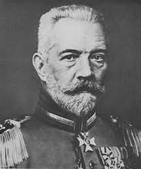
Theobald Von Bethmann-Hollweg
(November 29, 1856– January 1, 1921)
Was a German politician and statesman who served as Chancellor of the German
Empire from 1909 to 1917.
Early life
He was born in 1856 in Hohenfinow, Brandenburg, the son of Prussian official Felix von Bethmann-Hollweg and grandson of August von Bethmann-Hollweg, who had been a prominent law scholar, president of Frederick William University in Berlin, and Prussian Minister of Culture. Cosima Wagner was his relative from the von Bethmanns side. Theobald's mother Isabella de Rougemont was a French Swiss. A June 1919 Associated Press report from Berlin refers to the former chancellor as "of Jewish descent," which is in fact wrong.
He was educated at the boarding school of Schulpforta and at the Universities of Strasbourg, Leipzig and Berlin. Entering the Prussian administrative service in 1882 he rose to the position of the President of the Province of Brandenburg in 1899. After that he served as Prussian Minister of Interior from 1905 to 1907, and then as Imperial State Secretary for the Interior from 1907 to 1909. In 1909, on the resignation of Chancellor Bernhard von Bülow, Bethmann-Hollweg was appointed to succeed him.
In power
In foreign policy, he pursued a policy of détente with Britain, hoping to come to some agreement that would put a halt to the two countries' ruinous naval arms race, but failed, largely due to the opposition of German Naval Minister Alfred von Tirpitz. Despite the increase in tensions due to the Second Moroccan Crisis of 1911, Bethmann-Hollweg did improve relations with England to some extent, working with British foreign secretary Sir Edward Grey to alleviate tensions during the Balkan Crises of 1912-1913, and negotiating treaties over an eventual partition of the Portuguese colonies and the Berlin-Baghdad railway. In domestic politics, Bethmann-Hollweg's record was also mixed, and his policy of the "diagonal", which endeavored to maneuver between the Socialists and Liberals of the left and the right-wing nationalists of the right, only succeeded in alienating most of the German political establishment.
Following the assassination of Archduke Franz Ferdinand in Sarajevo on June 28, 1914, Bethmann-Hollweg and Foreign Secretary Gottlieb von Jagow were instrumental in urging the Austrians to take a tough stand against Serbia, and later, took steps to prevent Grey's efforts to impose a peaceful solution on the quarreling parties. In the last days before the outbreak of war, however, he seems to have had some second thoughts, and he took half-hearted measures to support Grey's proposals of mediation, until Russia's mobilization on July 31, 1914, took the matter out of his hands.
(November 29, 1856– January 1, 1921)
Was a German politician and statesman who served as Chancellor of the German
Empire from 1909 to 1917.
Early life
He was born in 1856 in Hohenfinow, Brandenburg, the son of Prussian official Felix von Bethmann-Hollweg and grandson of August von Bethmann-Hollweg, who had been a prominent law scholar, president of Frederick William University in Berlin, and Prussian Minister of Culture. Cosima Wagner was his relative from the von Bethmanns side. Theobald's mother Isabella de Rougemont was a French Swiss. A June 1919 Associated Press report from Berlin refers to the former chancellor as "of Jewish descent," which is in fact wrong.
He was educated at the boarding school of Schulpforta and at the Universities of Strasbourg, Leipzig and Berlin. Entering the Prussian administrative service in 1882 he rose to the position of the President of the Province of Brandenburg in 1899. After that he served as Prussian Minister of Interior from 1905 to 1907, and then as Imperial State Secretary for the Interior from 1907 to 1909. In 1909, on the resignation of Chancellor Bernhard von Bülow, Bethmann-Hollweg was appointed to succeed him.
In power
In foreign policy, he pursued a policy of détente with Britain, hoping to come to some agreement that would put a halt to the two countries' ruinous naval arms race, but failed, largely due to the opposition of German Naval Minister Alfred von Tirpitz. Despite the increase in tensions due to the Second Moroccan Crisis of 1911, Bethmann-Hollweg did improve relations with England to some extent, working with British foreign secretary Sir Edward Grey to alleviate tensions during the Balkan Crises of 1912-1913, and negotiating treaties over an eventual partition of the Portuguese colonies and the Berlin-Baghdad railway. In domestic politics, Bethmann-Hollweg's record was also mixed, and his policy of the "diagonal", which endeavored to maneuver between the Socialists and Liberals of the left and the right-wing nationalists of the right, only succeeded in alienating most of the German political establishment.
Following the assassination of Archduke Franz Ferdinand in Sarajevo on June 28, 1914, Bethmann-Hollweg and Foreign Secretary Gottlieb von Jagow were instrumental in urging the Austrians to take a tough stand against Serbia, and later, took steps to prevent Grey's efforts to impose a peaceful solution on the quarreling parties. In the last days before the outbreak of war, however, he seems to have had some second thoughts, and he took half-hearted measures to support Grey's proposals of mediation, until Russia's mobilization on July 31, 1914, took the matter out of his hands.
